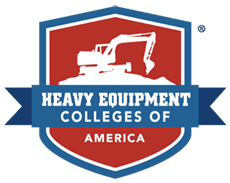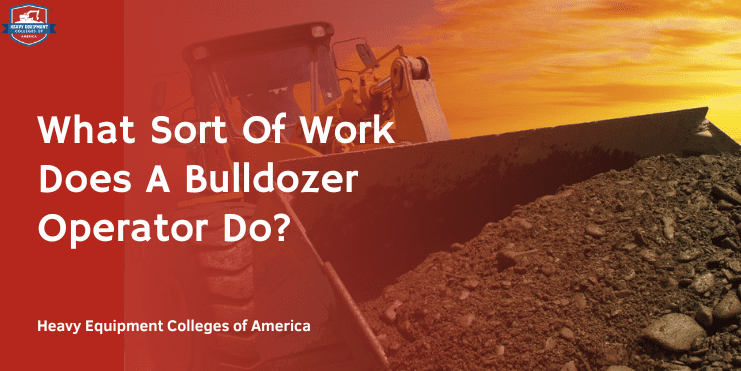Bulldozers are one of the most common pieces of heavy equipment on any construction site. They aren’t as versatile as some machines, but what they do is provide a powerful force for moving or pushing materials and debris. You’ll probably note that a bulldozer has a resemblance to a tractor. However, instead of using large tires to navigate, bulldozers use tracks like a tank. This makes it easier for them to move around uneven terrain.
If you’re thinking about becoming a bulldozer operator, then you’ll need to know what would be expected of you. This blog will cover what you’ll do as a bulldozer operator.
Table of Contents
Bulldozer Operators Are in Demand
There is a growing need for skilled heavy equipment operators, like bulldozer operators. The field is projected to grow 5% over the next decade according to the Bureau of Labor Statistics. Around 51,500 roles will open up per year over that time frame. As of May 2021, the median pay for operators, including bulldozer operators, was $48,290.
What Do Bulldozer Operators Do?
A bulldozer operator’s main role is to use their machine to push dirt or debris. It sounds easy, but it’s not always that simple. Before you can start pushing dirt around, you need to know what kind of surface you’re working on and how that could affect your duty. Some soil types may react differently to being pushed around. That means you’ll need a solid plan in place before work can begin.
Bulldozers can also have several attachments added to their rear. These attachments are for ripping up compact areas, digging up roots, and breaking concrete surfaces.
When you’re not pushing dirt around, your other duties are to your machine. You’ll need to inspect your machine before and after each use to help ensure it works properly. During the inspection, you’ll check fluid levels and look for any signs of damage.
How to Become a Bulldozer Operator?
What Skills You Needed To Become a Dozer Operator
Operating a bulldozer isn’t like driving a car. You need several skills to safely operate a machine this powerful. Here are some of the skills you’ll need to gain before pursuing your career as a bulldozer operator.
- Knowledge of heavy equipment
- Ability to inspect and maintain machinery
- Understanding of safety procedures and protocols
- Ability to follow operating instructions
There are also intangible skills that a bulldozer operator needs to be fit for this type of role.
- Mechanical and technological aptitude
- Hand-eye coordination
- Communication
- Be a team player
- Attention to detail
- Critical thinking
What Not To Do in Bulldozer
When you’re new on the job, it can be difficult to know exactly what not to do until you’ve built up some experience. This doesn’t have to be you. Read through this handy ‘what not to do’ list.
1. Moving Too Fast
You want to get the job done efficiently—but going too fast can lead to mistakes. Take your time while in the operator’s cab. As you build up experience, you’ll be more comfortable speeding things up.
2. Not Loading Your Blade
To make surfaces level, some operators will skim the top of their pile. However, if you don’t load your blade, you might not have enough material to fill in all dips and holes.
What Not to Do in Bulldozer?
3. Using the Decelerator To Control Speed
New operators make the common mistake of using the decelerator to control their speed. An experienced operator knows that they should use the joystick. If the engine is not running at full RPM, the machine won’t deliver full power to the tracks. Lay off the decelerator and instead use the joystick to control your speed.
4. Turning Too Much
When the blade is loaded, don’t try turning. You’ll be dividing the power on the tracks to one side or the other. If you want to move material in one direction, you need to supply equal power to both tracks. Do this by swinging the blade instead of turning too much.
5. Leaving The Blade Up After Parking
When the workday is done, you’ll park and shut off your machine. Just be sure to lower the blade before shutting down the machine. Leaving the blade up makes it harder for you to exit and for the next person to enter.
How Long Does It Take To Learn To Drive a Bulldozer?
One of the biggest barriers people face when choosing a career or switching careers is the time it will take to get started. If you’re thinking about becoming a bulldozer operator, this problem shouldn’t be much of an issue. You can learn the basics of bulldozer operation in about two hours. It may seem unbelievable, but you really can learn enough to perform simple jobs.
Of course, it takes much longer than that to understand the safety issues, inspection details, and maintenance that is expected of you. But you can find a heavy equipment operator training program that can cover all these crucial details in just a few weeks.
Is Operating a Bulldozer Hard?
Bulldozer operation can be relatively easy if you have the right training. One of the hardest parts about operating a bulldozer is learning how to steer properly. But with enough time and practice, you can learn techniques that’ll make it easier to operate.
You also need to know about the surface you’re traversing. This can add a layer of difficulty to your operation. Hidden objects like rocks and tree stumps can make it more difficult to navigate your machine.
A solid training program will provide you with all the knowledge you need to safely operate a bulldozer. They’ll go over soil types, what to look out for, and other important information related to bulldozer operation.
Where Can You Find Heavy Equipment Schools?
Ready to begin training as a bulldozer operator? Then you’ll need to find a school that offers heavy equipment training. If you want to find one close to you, explore Heavy Equipment College of America’s multiple locations. Explore what programs are available at each location and apply today.
Heavy Equipment Programs Offered at Heavy Equipment Colleges of America (HEC)
When looking for heavy equipment training, you should look for programs that put you first. HEC has an array of training programs that’ll prepare you for roles like bulldozer operation by providing you with hands-on experience and in-class instruction. We put students on the path to employment by offering programs that can be completed in as little as three weeks. But our dedication to you doesn’t end at graduation. Our students have access to career services like mock interviews, resume building, and more. Explore our programs today.

